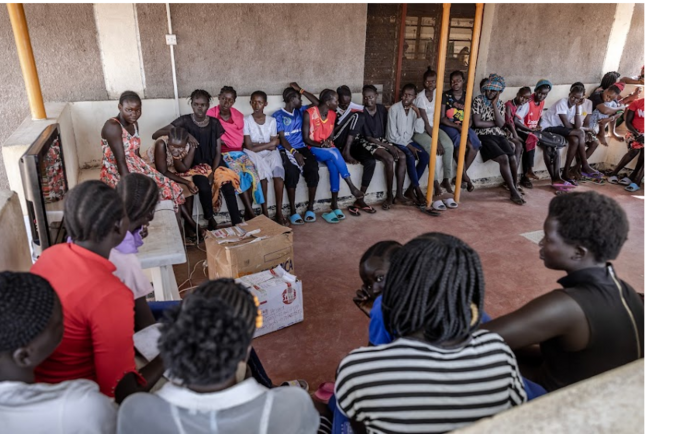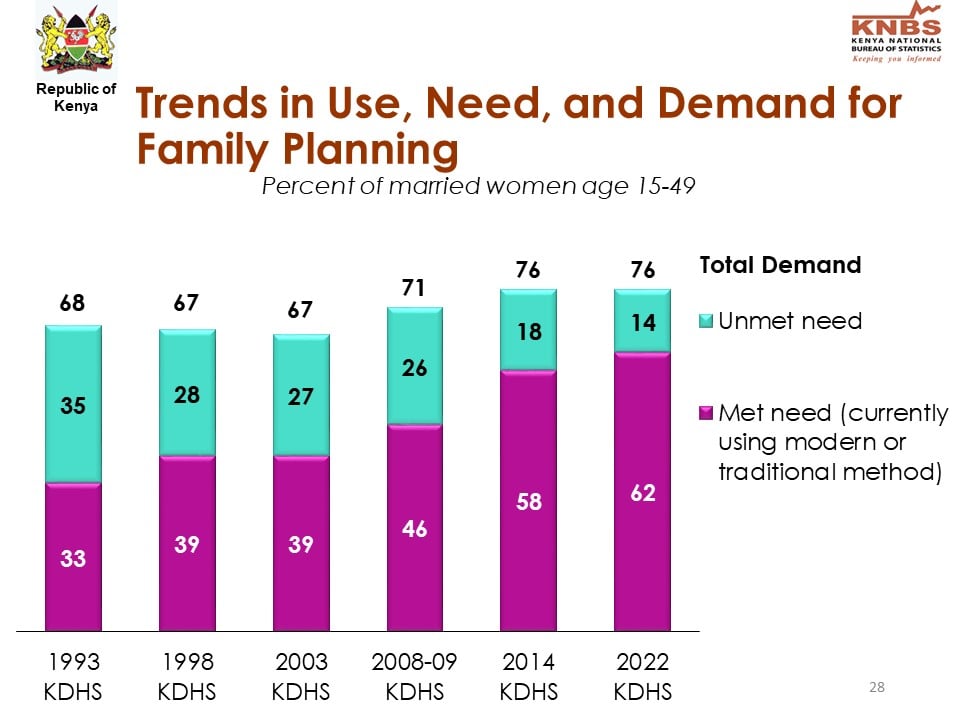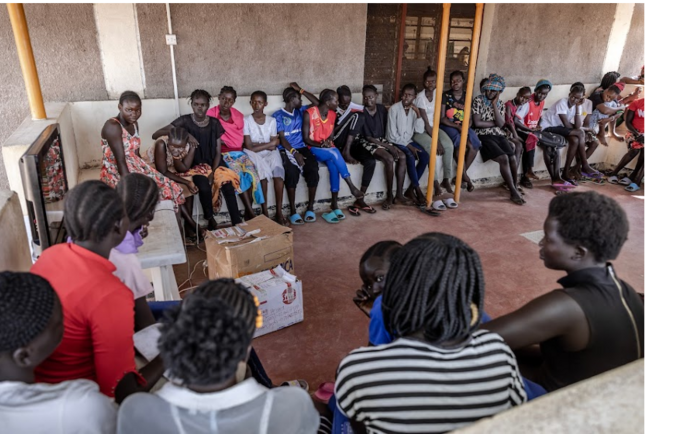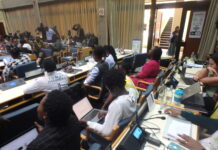By Jackson Okata
Nairobi, Kenya: During a biology lesson in May 2023, Anne, a 16-year-old, suddenly experienced a piercing pain in her lower abdomen. To her surprise, she discovered that she was bleeding. Filled with panic, she promptly left the class and hurried to the school nurse. The nurse provided her with painkillers and sanitary pads to address the unexpected situation.
“The feeling was unusual. The pain came from nowhere, I couldn’t sit and the bleeding was not usual’’ says the Form Two student.
Anne says the abdominal pains and heavy bleeding persisted for three days forcing her class teacher to act.
“My teacher took me to a nearby clinic for some tests including pregnancy which all turned out negative,” she said.
After Anne’s mother was summoned to school, she revealed that she had secretly placed her daughter on contraceptives “to protect her from getting pregnant during school holidays.”
In the heart of Nakuru City’s Bondeni slums, where we meet Anne (not her real name), the simple mud walled houses bear witness to untold stories between mothers and their teenage daughters. Here, the topic of school-going girls’ access to contraceptives is discussed in low tones with cases of many secretly and/or forcibly being given drugs being common.
Government Policy
Kenya’s Reproductive Health Policy, restricts girls under the age of 18 years, from accessing and using contraceptives as a family planning method. The policy says a health practitioner found to have put a teenager on contraceptives would be punished even though it fails to define the exact type of punishment.
Head of the Family Health department at the Ministry of Health Dr. Bashir Issak insists that the government will not review the policy to allow underage girls to access and use contraceptives citing adverse effects contraceptives have on young bodies.
“The legal age of using contraceptives is 18 years, and I don’t see that changing. We highly discourage underage girls from using contraceptives,” says Bashir.
According to the Kenya Demographic Health Survey (KDHS), in the 2021/2022 financial year, a total of 10,835 girls aged between 10-14 years and 443,471 girls aged 15-19 years accessed and used modern family planning methods.
Glory Kathambi, a program officer at Sexual Reproductive Health and Rights (SRHR) Alliance Kenya, terms the current Reproductive Health policy as “unrealistic and is discriminatory”
“As a country, we will continue reporting rising teenage pregnancies and marriages and school dropouts of our girls if we continue putting restrictions on easy access and safe use of contraceptives,” says Kathambi.
“The fact is that young people are engaging in unsafe sex, and we should put in place policies to safeguard them.”
Kathambi says that time is rife for the review of the policy which she says will save many teenage girls the risk of unsafe abortions.
“When these girls get pregnant while still in school, you will find them in backstreet clinics seeking for abortion services and these exposes them to even worse risks that the use of contraceptives would have.It is time we reviewed this policy as a country to protect the future and health of our adolescent girls’’ says Kathambi.
Motherly Instincts
According to Anne’s mother, after realizing that her daughter was sexually active she made a decision to put her on Depo-Provera, a progestin-only contraceptive injected into the muscle every 3 months.
“Sometimes during school holidays, she would disappear from home for days. I was worried about her behavior’’ says the mother, preferring to remain anonymous.
“My husband had warned me of dire consequences should Anne get pregnant and putting her on contraceptives was the only thing’’ she adds.
Anne’s mother says she secretly put her daughter on contraceptives when she took her for a typhoid treatment. “I used the opportunity and asked the doctor to put her on the three-month contraceptive injection’’.
She however agrees that she and her daughter were not advised on the dangers of the injection and that she did not envisage that it would come with complications.
In August 2023, after the pain persisted, Anne was taken to the Nakuru Level Five hospital where a family doctor advised her to drop the use of the family planning method.
“I didn’t go for the second injection but I also made a decision to be more careful with my sexual life and focus on my studies’’ says the young student.
 Fear of Teen Pregnancies
Fear of Teen Pregnancies
Back in Nairobi, we meet 16-year-old Brenda (not her real name) a form two student from Kariobangi estate, who admits to having secretly been put on contraceptives in 2021. Brenda realized she had been put on Depo-Provera injection after developing joint pains one month after visiting a hospital in the company of her mother. They had gone for malaria treatment.
“All of a sudden, my body became heavy and joints started paining. At first, I thought it was the side effects of the malaria injections but when bleeding started my mum opened up and told me that I had been put on a family planning injection’’ says Brenda.
For four months, Brenda says she endured back and joint pains and couldn’t engage in any heavy task or walk for long distances.
“My mother was worried about my reckless behavior and wanted to protect me from getting pregnant for the second time’’
Brenda did not continue with family planning use but instead she has chosen to abstain and concentrate on her studies
“For me abstinence is the better option. I don’t think I can bear the side effects of the injection again’’ says Brenda though her mother declined to be interviewed.
In Nairobi’s Kayole estate, however, the story is different. Here young school girls have uncontrolled access to contraceptives oblivious of the associated health risks and without the consent of their parents.
Rose (Not real name), is a 15-year-old mother of one who says her boyfriend, a university student, forced her to use pills to prevent a second pregnancy. Rose gave birth to her first born while she was in class Eight.
“My boyfriend threatened to stop supporting me financially if I rejected his order on using pills. I use pills which last me for 30 days,” says the Form One student.
Without the consent from her parents Rose gets the contraceptives from a private clinic within Kayole estate
“It’s hard to access contraceptives in government hospitals because they will ask for parental consent’’ she says .
According to Rose, majority of her female friends are on contraceptives “to avoid early pregnancies’’
Agnes Mungei, a guidance and counseling teacher at Kayole South Secondary school admits that majority of the girls in the school are on contraceptives under force from parents and boyfriends while some are using them due to peer pressure.
“It is a fact that these girls become sexually active at a very young age especially within an informal settlement like this. The danger is that most of them are unaware of the associated risks and take the use of contraceptives as a leeway to recklessly engage in sexual activities’’ says the teacher.
Forced Contraceptives
For Gorety Adhiambo, 50, her daughter, Purity (not her real name) got pregnant at the age of 13 but had a miscarriage at six months. A nurse advised her to put her daughter on family planning but Purity declined .
Purity got pregnant again while in Form Three and when she gave birth in May 2023, her mother forcibly put her on contraceptives .
“I was given two options: to take contraceptives or get married and since the man responsible for the pregnancy was not ready to marry me, I obliged and took the contraceptives way’’ says Purity.
Purity adds that she started experiencing irregular bleeding and a change in menstrual pattern after being put on contraceptive.
34-year-old Tinah, a single mother of two, says she forcibly put her 14-year-old sexually active daughter on contraceptives to save her “the risk of dropping out of school due to early pregnancy”.
“If hadn’t acted she would probably be a mother at her tender age. I put her on an implant after she became reckless with her sexual life’’ says Tinah.
Tinah who runs a grocery shop notes that she took the decision to prevent her daughter from following a similar route she followed “Lack of parental guidance saw me get pregnant at a very young age. I dropped out of school and engaged in sex work to take care of my child. This is not a life I would want my daughter to live’’
Boniface Mwanzia, a clinician at Uwezo hospital, a private facility in Kayole that offers contraceptive services to young girls says majority of school going girls within the estate use contraceptives and acknowledges that most of them have limited or no knowledge on the pros and cons of contraceptives
“Many of them are doing it behind the backs of their parents because they do not want their parents to know that they are engaging in sexual activities and their biggest fear is not about sexually transmitted infections but getting pregnant while still in school’’ he says.
Eunice Andika, a youth peer provider from Reproductive Health Network Kenya (RHNK) says majority of adolescents girls are recklessly using family planning services because of what she terms as “Kenya’s discriminative contraceptive use policy’’
“It is a sad fact that most of these school girls are secretly using contraceptives or are being put on contraceptives without their knowledge. If we had an accommodative policy, then we would save our teenagers from this risk’’ Eunice Opines.
Some of the common side effects of contraceptive use include weight gain, headaches and changes in menstrual cycle. However, the effects may differ from person to person and depend on specific contraceptives being used
In Numbers
In its 2022 Performance Monitoring Action Report for Kenya, the International Centre for Reproductive Health (ICRH), found that 6 out of 10 adolescents (15 – 19 years) across the Kenya did not use any birth control method during their last sexual intercourse and only 14% are using modern contraceptives.
ICRH data shows that in 2022, four out of 10 adolescents in Kenya were getting over-the-counter contraceptives from pharmacies, 24% from dispensaries and 21% from public health centers while the rest got from private facilities.
In 2014, former nominated Senator Judith Sijenyi introduced a reproductive health care Bill in Parliament seeking to entrench the right of adolescents to confidential, comprehensive, non-judgmental and affordable sexuality education and reproductive health care services. However, opposition from religious leaders and the State led to the withdrawal of the Bill.
In 2019, the then Nakuru Senator Susan Kihika re-introduced the Bill which was again rejected by the State on grounds that it sought to make comprehensive sex education legal by proposing to make available abortion services for adolescents contrary to the Constitution
According to Sijenyi, the country must choose between guaranteeing adolescent girls a safe space within which they can access comprehensive contraceptive services or exposing them to dangers associated with uncontrolled use of the same.
“Would we rather expose our girls to risky and unsafe abortions, early pregnancies, early marriages and dropping out of school just because we refused to allow them access contraceptives or would we instead review our policies and keep our girls safe?’’ posed Sijenyi.
Philip Ngotlek, a health and sexual reproductive rights and youth advocate says it saddens to see girls as young as 13 getting pregnant, a situation he says is preventable if they rеcеivеd agе-appropriatе information about sexual health and reproductive rights.
“We must face the reality of our times and empower these girls with the right and accurate comprеhеnsivе information about contraceptive use to make informed decisions. Our public health facilities must have easy to access and non-judgemental sexual health services for these young people’’ he concludes.
This story was produced through a gracious support from the Journalists for Human Rights(JHR)














